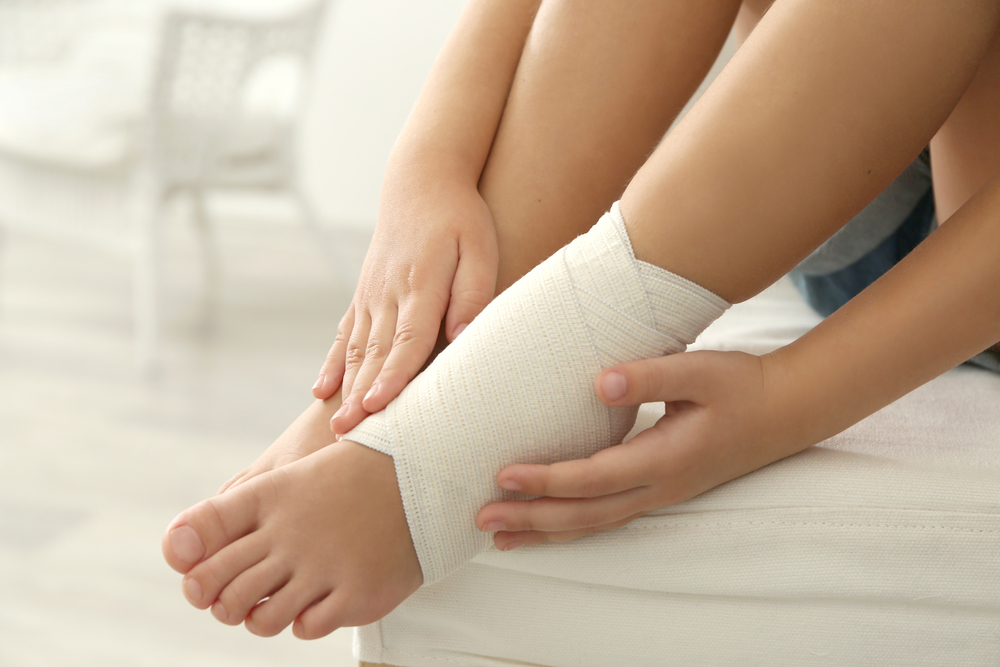Using the Right Bandage for Foot Wounds
Monday, 27 April 2020 00:00 Patients who are afflicted with diabetes may be familiar with wounds on the feet that need to be promptly treated. This generally involves dressing the wound with the proper type of bandage, and this can possibly make a significant difference in how the wound heals. Research has indicated the importance of keeping the skin dry, and it is beneficial to avoid using excessively hot water while bathing. Skin tears to the feet can be painful, and this can happen from accidently bumping into a wall. It is helpful to dress it with a non-adhesive bandage, which may prevent it from becoming larger. If you have any type of wounds on the feet, it is advised that you consult with a podiatrist who can properly treat them.
Patients who are afflicted with diabetes may be familiar with wounds on the feet that need to be promptly treated. This generally involves dressing the wound with the proper type of bandage, and this can possibly make a significant difference in how the wound heals. Research has indicated the importance of keeping the skin dry, and it is beneficial to avoid using excessively hot water while bathing. Skin tears to the feet can be painful, and this can happen from accidently bumping into a wall. It is helpful to dress it with a non-adhesive bandage, which may prevent it from becoming larger. If you have any type of wounds on the feet, it is advised that you consult with a podiatrist who can properly treat them.
Wound care is an important part in dealing with diabetes. If you have diabetes and a foot wound or would like more information about wound care for diabetics, consult with Dr. Robert Graser from Graser Podiatry and Bunion Surgery Institute. Our doctor will assess your condition and provide you with quality foot and ankle treatment.
What Is Wound Care?
Wound care is the practice of taking proper care of a wound. This can range from the smallest to the largest of wounds. While everyone can benefit from proper wound care, it is much more important for diabetics. Diabetics often suffer from poor blood circulation which causes wounds to heal much slower than they would in a non-diabetic.
What Is the Importance of Wound Care?
While it may not seem apparent with small ulcers on the foot, for diabetics, any size ulcer can become infected. Diabetics often also suffer from neuropathy, or nerve loss. This means they might not even feel when they have an ulcer on their foot. If the wound becomes severely infected, amputation may be necessary. Therefore, it is of the upmost importance to properly care for any and all foot wounds.
How to Care for Wounds
The best way to care for foot wounds is to prevent them. For diabetics, this means daily inspections of the feet for any signs of abnormalities or ulcers. It is also recommended to see a podiatrist several times a year for a foot inspection. If you do have an ulcer, run the wound under water to clear dirt from the wound; then apply antibiotic ointment to the wound and cover with a bandage. Bandages should be changed daily and keeping pressure off the wound is smart. It is advised to see a podiatrist, who can keep an eye on it.
If you have any questions, please feel free to contact our office located in Boerne, . We offer the newest diagnostic and treatment technologies for all your foot care needs.
Blog Archives
- July 2024
- June 2024
- May 2024
- April 2024
- March 2024
- February 2024
- January 2024
- December 2023
- November 2023
- October 2023
- September 2023
- August 2023
- July 2023
- June 2023
- May 2023
- April 2023
- March 2023
- February 2023
- January 2023
- December 2022
- November 2022
- October 2022
- September 2022
- August 2022
- July 2022
- June 2022
- May 2022
- April 2022
- March 2022
- February 2022
- January 2022
- December 2021
- November 2021
- October 2021
- September 2021
- August 2021
- July 2021
- June 2021
- May 2021
- April 2021
- March 2021
- February 2021
- January 2021
- December 2020
- November 2020
- October 2020
- September 2020
- August 2020
- July 2020
- June 2020
- May 2020
- April 2020
- March 2020
- February 2020
- January 2020
- December 2019
- November 2019
- October 2019
- September 2019
- August 2019
- July 2019
- June 2019
- May 2019
- April 2019
- March 2019
- February 2019
- January 2019
- December 2018
- November 2018
- October 2018
- September 2018
- August 2018
- July 2018
- June 2018
- May 2018








